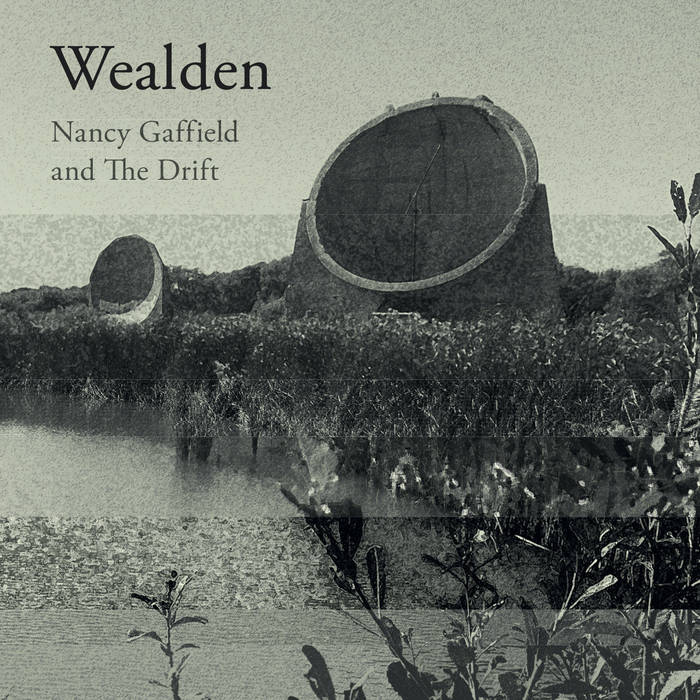With poetry by Nancy Gaffield and music by The Drift, ‘Wealden’ — newly released by Longbarrow Press/Skep Wax — investigates the Kentish landscape, from the marshland of the High Weald down to the sea at Dungeness. Alistair Fitchett reviews.

I can never quite decide if familiarity with artists makes responding to new work easier or harder. The anticipation of encountering something we think we know can be profoundly comforting or painfully disappointing. Certainly there will be many people for whom the names Amelia Fletcher and Rob Pursey will immediately conjure thoughts of Heavenly supercharged frothing Indiepop, and that is fair enough. They may even be aware of more recent meanderings into the realms of folk-inflected work as Catenary Wires, recent collaboration with Pooh Sticks’ Hue Williams as Swansea Sound or with Steve Miles on the excellent Velvet Underground parody/homage European Sun LP. As varied as those outings may be, however, it is fairly certain that a new project as The Drift will come as something of a surprise.
In this venture Pursey and Fletcher are joined by folk musician and field recordist Darren Pilcher, and poet Nancy Gaffield, whose textures, sounds, natural rhythms and spoken words provide root and bedrock to the three lengthy pieces that comprise Wealden. Now I will admit that I have often found something irritating in the performance of poetry. The sing-song-serious spoken word delivery that appears to be the default setting for any poet who ever ‘performed’ regularly sends me over the edge of reason, the cadences slicing into my ears like salted scalpel blades. Only when the spoken voice is combined with other textures does my anxiety ease. Attention diverted. Music and noise, noise and music, blending and merging in mutually supportive eloquence. Thankfully this is very much the case with Wealden, where words and sound were often worked up together, each making iterative alterations to the other as the work evolved. The words inform the sound and the sound influences the words. And through it all, the magical strangeness of landscape and history.
Gaffield at times sounds a little nervous, her voice trembling just so. It makes for an interesting listen, at odds with what perhaps we have come to expect from American accents. Odd perhaps too that it is an American accent unfolding words about English landscape, not unlike Justin Hopper talking about Chanctonbury Ring. Except of course it is not odd at all, for landscapes care nothing for the notions of nationalities drawn on them by humans, and a voice is nothing more nor less than a unique intervention in the air. Indeed Gaffield, whose roots are in New Mexico and Colorado, has noted that her initial amusement at Dungeness being described as the only desert in Western Europe turned to understanding when experiencing the light-bending peculiarity of the place. The magic of landscape knows no borders.
It is of course that landscape of the Weald that The Drift and Gaffield explore. A ‘faulted land, rolling east to west’ with ‘steep sided tree belts, where backwaters merge with the Medway, the Ouse and Arun’. It is a landscape where ‘time gathers in the silt drifting out to sea’ and it is that time and the stories it holds that weave like golden threads through Wealden. Here are the ‘deep narrow droveways’, there the ‘swingle swangle cottages where women once span flax for linen’. Up on the High Weald we see the houses arranged like ‘a crowded mantlepiece’ whilst down on the plain we cross wooden planks, visit Fairfield church and spot ‘isolated lookers’ huts’, all the while reminded by Gaffield of the ecological importance of these natural resources, with which we must live in harmony and respect. Then finally to the sea at Dungeness, where we greet the ‘#ruinporn’ of the Greatstone sound mirrors and the ‘flocks of thrushes’ who ‘fiddle and drum’.
The rate of natural, geological change in landscape is inexorably slow, even in the relatively new landlocked (re)configurations of the coastline explored by Gaffield and The Drift. History too evolves around us in subtle shifts that we often do not see until moments are long passed. Even climactic (and climatic) events such as the Great Storm of 1287 that made massive overnight geographical changes are rapidly subsumed into the ever-expanding picture, becoming delicious details to enjoy from further and further away. It seems to me that this is a significant part of their attraction: They are elements beyond our control and outside of our daily short-term perception. Touching them takes effort, time and a devotion that is richly rewarded. And that’s as fine a metaphor for experiencing Wealden as any.
*
‘Wealden’ is available as a pamphlet and CD from Longbarrow Press, or as a digital download from the Skep Wax label’s Bandcamp page.